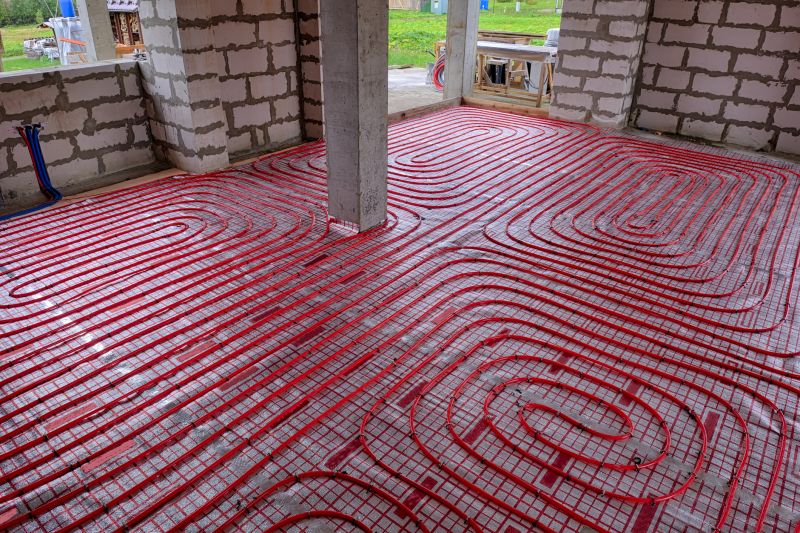The Ultimate Collection of Radiant Floor Service Essentials
A curated selection of must-have products to improve efficiency, durability, and comfort in radiant floor heating setups.
 Radiant floor service involves the installation, maintenance, and repair of systems designed to provide efficient and consistent heating through the floors. These systems can include electric mats, hydronic tubing, and specialized insulation materials that work together to deliver warmth directly to living spaces. Proper selection of components and accessories is essential to ensure optimal performance and longevity of the radiant heating setup.
Radiant floor service involves the installation, maintenance, and repair of systems designed to provide efficient and consistent heating through the floors. These systems can include electric mats, hydronic tubing, and specialized insulation materials that work together to deliver warmth directly to living spaces. Proper selection of components and accessories is essential to ensure optimal performance and longevity of the radiant heating setup.
Top Overall Option
Electric Radiant Floor Heating Mat
An electric radiant floor heating mat provides a flexible and straightforward solution for adding warmth to various room sizes. These mats are designed to be easy to install beneath different flooring types and offer consistent heat distribution. They are suitable for retrofit projects and new constructions alike, often featuring adjustable thermostats for precise temperature control.
Types of Products For Radiant Floor Service
Electric Heating Mats
Flexible mats that can be laid beneath tile, stone, or laminate flooring for direct heat transfer.
Hydronic Tubing Systems
Water-based tubing installed within floors, connected to a boiler or water heater for efficient heat distribution.
Thermostats and Control Panels
Devices that allow precise regulation of floor temperature and system operation.
Insulation Barriers
Materials placed beneath the heating elements to improve efficiency by reducing heat loss downward.
Floor Sensors
Temperature sensors that provide real-time data to thermostats for consistent heating performance.
Connection Kits
Accessories that facilitate safe and secure electrical or water connections for radiant systems.
Floor Adhesives and Tapes
Specialized adhesives and tapes used to secure heating mats or tubing during installation.
Underlayment Materials
Support layers that enhance thermal performance and provide a smooth surface for flooring.
Electrical Junction Boxes
Enclosures that house electrical connections safely and facilitate maintenance.
Flow Meters and Pumps
Components used in hydronic systems to regulate water flow and maintain system efficiency.
Popular Choices
Widely used for their ease of installation and compatibility with various flooring types.
Popular for large-scale or whole-home heating applications, offering customizable layouts.
Trending for their ability to optimize heating schedules and improve energy management.
Commonly used to ensure accurate temperature regulation within radiant systems.
Preferred for their role in enhancing system efficiency and reducing heat loss.
Essential for secure electrical connections in radiant heating setups.
Favored for quick installation and minimal preparation time.
Critical for maintaining proper water circulation in hydronic radiant heating.
Useful for securing heating elements during installation, ensuring stability.
Popular for providing additional insulation and a smooth surface for flooring.
When considering radiant floor products, it is important to evaluate compatibility with existing flooring materials, the size of the area to be heated, and the specific heating requirements of the space. Installing a well-designed system can improve comfort levels and potentially enhance energy efficiency. Regular maintenance and the use of high-quality parts can prevent common issues such as uneven heating or system failure.
The market offers a wide range of products tailored to different needs, from flexible heating mats that conform to various floor layouts to durable tubing systems suitable for large-scale installations. Accessories such as thermostats, sensors, and insulation barriers also play a critical role in ensuring the system operates smoothly. Understanding the features and specifications of these products can help homeowners and professionals make informed choices.
Whether you are upgrading an existing system or installing radiant heating for the first time, selecting the right products is a key step. Proper planning and the use of reliable components can lead to a comfortable, efficient, and long-lasting radiant floor heating solution that enhances the overall ambiance of your space.
Key Buying Considerations
- Compatibility with existing flooring materials and subfloor structure.
- Size and layout of the area to be heated to determine system capacity.
- Type of heating system (electric vs hydronic) suited to your project needs.
- Ease of installation and whether professional assistance is recommended.
- Adjustability and control options provided by thermostats and sensors.
- Thermal insulation options to maximize efficiency and reduce heat loss.
- Durability and material quality to ensure long-term performance.
- Power requirements and electrical capacity of your home or building.
- Maintenance needs and accessibility for future repairs.
- Compatibility with smart home systems or automation features if desired.
- Cost considerations including initial investment and operational expenses.
- Availability of replacement parts and accessories for future upgrades.
- Warranty and customer support from product manufacturers.
- Safety features such as overheating protection and proper electrical grounding.
- Flooring type compatibility to prevent damage or performance issues.
